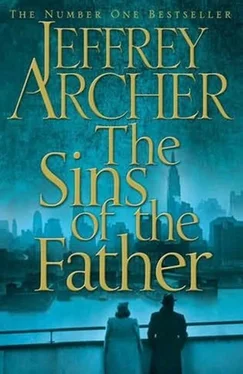‘We’ll be ready for him, sir,’ said Fisher.
‘Good. Because I’m putting you in charge of our new patrols, Fisher. Barrington, you will remain second in command.’
‘I’ll have my report on your desk by midday, sir,’ said Fisher.
‘Good show, Fisher. I’ll leave you to work out the details.’
‘Thank you, sir,’ said Fisher, standing to attention and saluting as the colonel left the room.
Giles was about to speak, but Fisher quickly jumped in. ‘I’ve put in a recommendation that Sergeant Harris should be awarded a posthumous military medal, and Corporal Bates should also be mentioned in dispatches. I hope you’ll support me.’
‘Am I also to understand that you’ve been put up for a Military Cross?’ asked Giles.
‘That’s not in my hands, old fellow, but I’m happy to go along with whatever the commanding officer sees fit. Now, let’s get down to business. With six patrols now under our command, I propose that we…’

After what had become known by 1 and 2 sections as ‘Fisher’s Fantasy’, everyone from the colonel downwards was on red alert. Two platoons patrolled the western edge of the town, one on, one off, night and day, no longer wondering if, only when, Rommel would appear over the horizon at the head of his Afrika Korps.
Even Fisher, in his newly elevated state as hero, had to appear occasionally on the outer perimeter, if simply to maintain the myth of his heroic deed, but only long enough to be sure everyone had seen him. He would then report back to the tank squadron commander, three miles to the rear, and set up his field phones.

The Desert Fox chose April 11th, 1941 to begin his assault on Tobruk. The British and Australians couldn’t have fought more bravely when defending the perimeter against the German onslaught. But as the months passed and supplies of food and ammunition began to run low, few doubted – though it was never voiced – that it could only be a matter of time before the sheer size of Rommel’s army would overwhelm them.
It was a Friday morning, just as the desert haze was clearing, that Lieutenant Barrington scanned the horizon with his binoculars and focused on rows and rows of German tanks.
‘Shit,’ he said. He grabbed the field phone as a shell hit the building he and his men had selected as their observation post. Fisher came on the other end of the line. ‘I can see forty, possibly fifty tanks heading towards us,’ Giles told him, ‘and what looks like a full regiment of soldiers to back them up. Permission to withdraw my men to a more secure position where we can regroup and take up battle formation?’
‘Hold your ground,’ said Fisher, ‘and once the enemy’s within range, engage them.’
‘Engage them?’ said Giles. ‘What with, bows and arrows? This isn’t Agincourt, Fisher. I’ve got barely a hundred men facing a regiment of tanks, with nothing more than rifles to protect ourselves. For God’s sake, Fisher, allow me to decide what’s best for my men.’
‘Hold your ground,’ repeated Fisher, ‘and engage the enemy when they come within range. That’s an order.’
Giles slammed the phone down.
‘For some reason best known to himself,’ said Bates, ‘that man doesn’t want you to survive. You should have let me shoot him.’
Another shell hit the building while masonry and rubble began to fall around them. Giles no longer needed binoculars to see just how many tanks were advancing towards them, and to accept that he only had moments left to live.
‘Take aim!’ He suddenly thought of Sebastian, who would inherit the family title. If the boy turned out to be half as good as Harry had been, the Barrington dynasty need have no fear for its future.
The next shell hit the building behind them, and Giles could clearly see a German soldier returning his stare from the turret of his tank. ‘Fire!’
As the building began to collapse around him, Giles thought about Emma, Grace, his father, his mother, his grandfathers, and… The next shell brought the entire edifice crashing down. Giles looked up, to see a large piece of masonry falling, falling, falling. He leapt on top of Bates, who was still firing at an advancing tank.
The last image Giles saw was Harry swimming to safety.
1941
EMMA SAT ALONE in her hotel room reading The Diary of a Convict from cover to cover. She didn’t know who Max Lloyd was, but she was sure of one thing: he wasn’t the author.
Only one man could have written this book. She recognized so many familiar phrases, and Lloyd hadn’t even bothered to change all the names, unless of course he had a girlfriend called Emma whom he still adored.
Emma turned the last page just before midnight, and decided to make a phone call to someone who would still be at work.
‘Just one more favour,’ she begged when his voice came on the line.
‘Try me,’ he said.
‘I need the name of Max Lloyd’s parole officer.’
‘Max Lloyd the author?’
‘No less.’
‘I’m not even going to ask why.’
She began to read the book a second time, making pencil notes in the margin, but long before the new deputy librarian had started, she had fallen asleep. She woke around five the next morning, and didn’t stop reading until a prison officer entered the library and said, ‘Lloyd, the warden wants to see you.’
Emma took a long, lazy bath, and considered the fact that all the information she’d been trying so hard to discover had been available for a dollar fifty from any bookstore.
Once she was dressed, she went down to breakfast and picked up a copy of the New York Times . She was taken by surprise as she turned the pages to come across a review of The Diary of a Convict .
We should be grateful to Mr Lloyd for bringing to our attention what is happening in our prisons today. Lloyd is a gifted writer with real talent, and we must hope that now he’s been released, he will not put down his pen.
He never picked it up in the first place, thought Emma indignantly as she signed her bill.
Before going back up to her room, she asked the receptionist to recommend a good restaurant near Doubleday’s bookstore.
‘The Brasserie, madam. It has a first-class reputation. Would you like me to book a table for you?’
‘Yes, please,’ said Emma. ‘I’d like a table for one at lunch today, and another for two this evening.’
The receptionist was quickly learning not to be surprised by the lady from England.
Emma returned to her room and settled down to read the diary once more. She was puzzled why the narrative opened with Harry’s arrival at Lavenham, despite the fact that there were several references scattered throughout the book which suggested that his previous experiences had also been recorded, even if they hadn’t been seen by the publisher, and certainly not the public. In fact, this convinced Emma that there had to be another notebook in existence, which would not only describe Harry’s arrest and trial, but might explain why he had put himself through such an ordeal, when a lawyer of Mr Jelks’s standing must have known that he was not Tom Bradshaw.
After reading marked pages of the diaries for a third time, Emma decided another long stroll in the park was required. As she walked up Lexington Avenue, she dropped into Bloomingdales and placed an order that she was assured would be ready for collection by three o’clock. In Bristol, the same order would have taken a fortnight.
As she walked through the park, a plan was beginning to form in her mind, but she needed to return to Doubleday’s and take a closer look at the store’s layout before she could apply the finishing touches. When she walked into the bookstore, the staff were already preparing for the author signing. A table was in place and a roped-off area showed clearly where the line should form. The poster in the window now had a bold red banner across it declaring, TODAY.
Читать дальше














